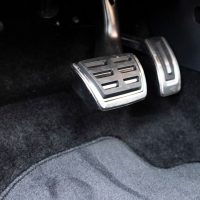Tesla Recalls Thousands of Cybertrucks for Defect That Could Trap the Accelerator Pedal Under the Trim

Earlier this year, Tesla recalled 3,878 2024 Cybertrucks for a defect in the accelerator pedal assembly that could cause the pedal pad to dislodge and the pedal to get trapped by the vehicle’s trim. A trapped or stuck accelerator pedal can cause the vehicle to accelerate rapidly and unintentionally, creating a risk of a violent collision. This recall is the largest and most serious to affect the much-heralded yet problem-plagued vehicle, but it is far from the only problem users have been experiencing.
Another recall just last month brings the running total to four recalls since Tesla put its Cybertruck on the market last November. The accelerator pedal defect, however, seems to be the one most likely to represent a serious safety issue. Other Cybertruck recalls relate to issues such as the front windshield wiper motor controller and a loose piece of trim on the truck bed.
As a reminder, California lemon law covers any defect that affects a vehicle’s safety, use or value. Manufacturers and dealers are allowed a reasonable number of attempts to fix the issue before a customer can invoke the lemon law and seek a refund, replacement or money damages. Fewer attempts are required if the problem involves a safety issue compared to problems affecting use or value.
A History of Tesla Vehicle Recalls Nearly as Old as Tesla Vehicles
Although Tesla presents itself as an innovative technology company manufacturing vehicles, it has not been free of vehicle defects warranting numerous recalls. Model S recalls, for instance, date back to 2012, the first year that the popular model was introduced.
At the time of this writing, Tesla’s website lists 23 open recalls affecting various critical parts and features such as the brake fluid level sensor, first-row seat belt anchors, and the Full Self-Driving Beta feature on several models. Several recalls relate to restraint systems, including seat belt anchors, tensioners, and a faulty seat belt warning light and audible charm which violates Federal Motor Vehicle Safety Standard (FMVSS) number 208, Occupant Crash Protection.
Tesla is also part of the Takata airbag recall, the largest recall in automotive history. Affected vehicles include all 2012 and 2013 Model S sedans. Recall notices were issued in 2017 and 2018, but as of April 2018, less than half of the recalls were completed.
Other recalls in Tesla’s past include serious safety issues such as potential loss of power steering assist due to corroded bolts, a faulty second-row seat latching mechanism, potential failure of the electric parking brake assembly, and improperly secured front seat belt mechanisms.
Tesla Continues to Recall in 2023, 2024
Tesla recalls have been continuing to the present day (most recently July 25th at the time of this writing), including many 2023 and 2024 Teslas.
Over two million vehicles including five different models from model years 2012 through 2024 are being recalled for a defect in the vehicle’s instrument panel affecting the Brake, Park, and Antilock Brake System (ABS) warning lights. This issue violates FMVSS 105 and 135 and could raise the risk of a crash by making critical safety warning lights difficult to read.
Many of the same vehicles noted above are part of another massive, multi-million vehicle recall, this time related to the Tesla Autopilot feature. Tesla issued this recall to prevent “driver misuse” of the Autosteer feature.
Meanwhile, nearly 200,000 2023 Tesla Model S, X and Y units are being recalled for a software instability that could prevent the rearview camera image from displaying, decreasing the driver’s visibility while in reverse and increasing the risk of a crash. Affected vehicles are those equipped with full self-driving computer 4.0 and running certain software release versions.
Additionally, over 100,000 Tesla Model S and X from 2021-2023 have been recalled for a defect that could cause the cabin doors to unlock during a crash. An unlocked door could unlatch and open during a crash, leading to vehicle ejection or other serious injury that could otherwise be prevented.
Contact Nita Lemon Law Firm for Help With Lemon Law Issues in California
Tesla warrants its vehicles for four years, during which time consumers can avail themselves of California lemon law protections when they have a problem that can’t be fixed after a reasonable number of attempts or too many days out of service. If you have a problem with your Tesla or any vehicle under warranty that is not being properly addressed, I want to hear from you. Call me, attorney Nick Nita, at Nita Lemon Law Firm by calling 213-232-5055 in Los Angeles or 877-921-5256 throughout California. You can also email me at nick@nitalemonlaw.com. Either way, I will respond promptly and be happy to look into your issue at no charge and let you know how I can help.
